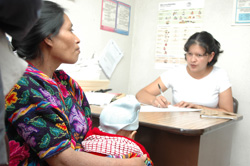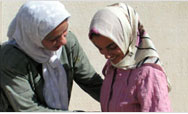You are here » Home » Telling Our Story
Success Story
Broadening access to knowledge about birth spacing
Improving Family Health and Wellbeing

| |
Photo: ACME Producciones/Hugo Gonzalez
|
|
A Guatemalan indigenous woman discusses options with a family planning counselor at a Ministry of Health facility in Chichicastenango, Quiché.
As more women and men learn about reproductive health and family planning, Guatemalan families will become healthier and stronger, and enjoy greater equality.
|
Inequality between the genders, social classes, and distribution of wealth is a source of tension in Guatemalan society. Scarce access to information aggravates these tensions. With 23 different national languages and more than 20,000 communities with populations of less than 2,000, communicating about critical issues like health care and family planning is no small task.
USAID has been working with local organizations to help inform Guatemalan women and men about the importance to maternal and child health of spacing their children’s births, as well as about their contraceptive choices. In an effort to strengthen Guatemala’s scarce family planning services and decrease fertility rates — the highest in Latin America — USAID works with the Ministry of Health to make family planning information and methods accessible to more couples. In addition, USAID helps the Guatemalan Family Planning Association, APROFAM, become financially sustainable so that it may continue covering the need for family planning services.
In a positive sign that Guatemala is improving access to family planning information and methods, Guatemala’s Congress passed a law — the Universal and Equitable Access to Family Planning Services Law — that stresses the need for family planning services and ensures that efforts to provide these services receive adequate financing. For the first time in Guatemala’s history, schools are now required to include reproductive health in their curriculum.
Couples are anxious for information and methods that can assist them in determining the number and timing of their children’s births as a way of improving family health and economic well-being. As fertility rates decrease, poverty rates are also expected to decline. As more women and men learn about reproductive health and family planning, Guatemalan families will become healthier and stronger, and enjoy greater equality.
Print-friendly version of this page (440kb - PDF)
Click here for high-res photo
Back to Top ^ | 

